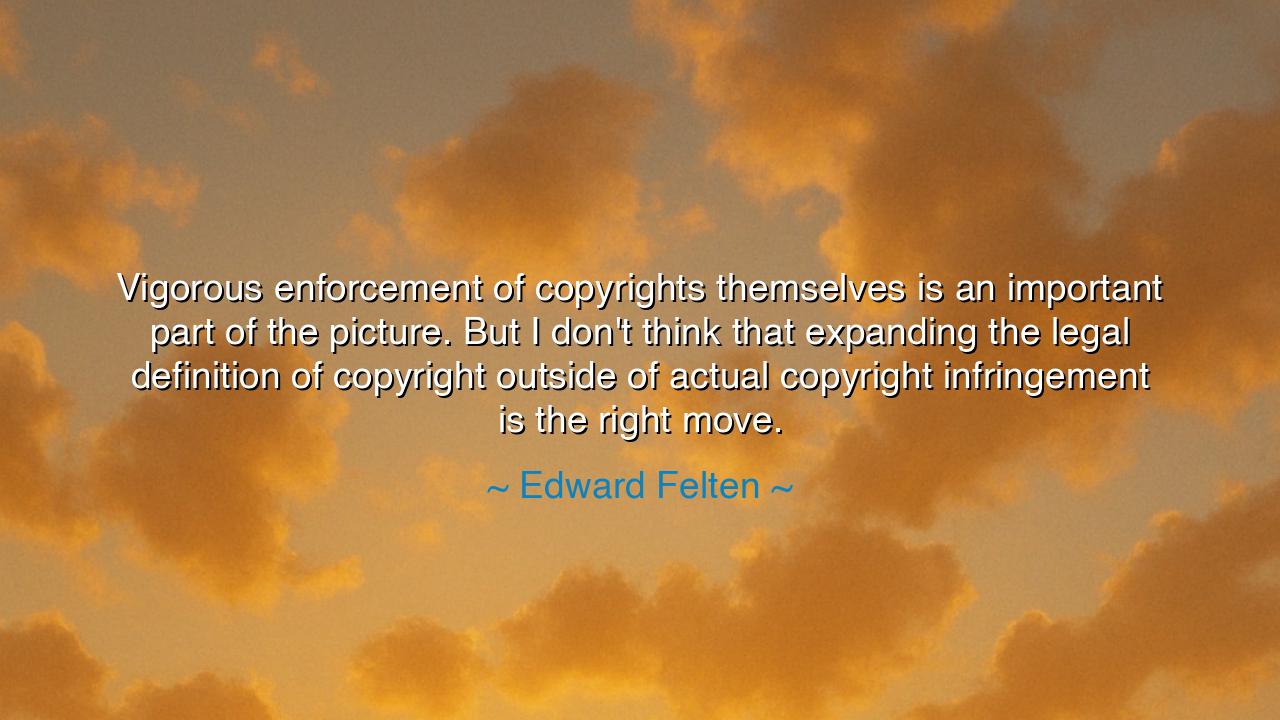
Vigorous enforcement of copyrights themselves is an important
Vigorous enforcement of copyrights themselves is an important part of the picture. But I don't think that expanding the legal definition of copyright outside of actual copyright infringement is the right move.






There are moments in civilization when the law must stand as both shield and compass—protecting the creator while guiding the progress of humanity. In these moments, the words of Edward Felten ring with timeless wisdom: “Vigorous enforcement of copyrights themselves is an important part of the picture. But I don't think that expanding the legal definition of copyright outside of actual copyright infringement is the right move.” His statement reminds us that while justice must defend creation, it must not imprison it. To safeguard art and innovation, one must honor the balance between protection and freedom, between ownership and inspiration.
The origin of the quote comes from the modern battlefield of ideas—the digital age, where knowledge travels at the speed of thought. Edward Felten, a computer scientist and defender of digital rights, spoke against the growing tendency of governments and corporations to expand copyright law beyond its rightful scope. In his time, the web had become both the library and the marketplace of the world, and powerful interests sought to control it by broadening what could be called “infringement.” Felten’s warning was clear: to guard creativity too tightly is to strangle it in its cradle.
Through the centuries, societies have wrestled with this same struggle. When the printing press was born, monarchs feared its power. They issued licensing laws to control who could print, to ensure that no knowledge could challenge the throne. But in time, those restrictions stifled not rebellion, but wisdom itself—and men like Milton rose to cry out for the liberty of unlicensed printing, reminding rulers that truth does not flourish in chains. Just as then, Felten’s voice in our era stands against the temptation to turn protection into domination. The law must serve the people, not the powerful.
Consider the story of Johannes Gutenberg, whose invention gave birth to the printed word for all. Had the rulers of his time expanded their legal grasp, declaring each copied page an offense, the Renaissance itself might have withered before it bloomed. Felten’s argument rests upon this same eternal truth: that creation feeds upon freedom, and freedom requires restraint in the use of power. right, rightly applied, is noble—it rewards the artist and inventor. But when its reach extends beyond infringement, when it begins to silence curiosity and experimentation, it becomes a tool of tyranny, not justice.
In these words, one can hear the echo of the ancients who spoke of balance and measure. The Greeks knew that excess—even in virtue—leads to destruction. Just as too little law breeds chaos, too much law breeds decay. To expand the legal definition of copyright without cause is to blur the line between defense and control. It is to replace reason with fear, and in doing so, to corrupt the very spirit of creativity that copyright was meant to protect. For every artist, scholar, and inventor lives upon the shared soil of human knowledge; if that soil is fenced too tightly, none may sow or reap again.
Felten’s caution is therefore not merely technical—it is moral. It asks whether we love truth and progress enough to let them breathe. For every generation faces the question: shall we protect ideas as treasures to be hoarded, or as seeds to be planted? The wise know that knowledge grows only when shared, and that the law, if not guided by humility, becomes a fortress against enlightenment. Just as the Roman Republic fell when its laws served power over people, so too could the age of information crumble beneath the weight of overprotection.
The lesson, then, is simple yet profound: defend creation, but do not suffocate it. Uphold justice, but let curiosity roam free. To those who build, write, code, or compose—protect your work, yes—but also remember that every idea is born from countless others before it. To those who govern, enforce laws with strength, but never expand them without wisdom. For civilization flourishes not when it guards every spark, but when it lets the fire of knowledge spread across the world. Let the young remember: freedom and fairness must walk hand in hand, or both shall fall together.
Thus, from the voice of Edward Felten comes a teaching for all ages: the law is strongest when it knows its limits. When justice restrains itself from becoming greed, when protection does not turn to domination, humanity rises. Let us therefore guard the sanctity of creativity, but never at the cost of the imagination that sustains it—for a world without freedom of thought is a world where even the brightest flame of genius burns in vain.






AAdministratorAdministrator
Welcome, honored guests. Please leave a comment, we will respond soon